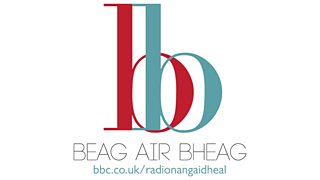Oisean a’ Ghrà mair Sreath 11: 4
CRIOMAG: Catrìona Mhoireach (Smuain na Maidne)

PUING 1. THATHAR: Tha neo-phearsanta | Impersonal form of Tha
Catrìona:
Mun tìde-sa bhliadhna, thathar a’ faighinn tlachd agus togail inntinn ann a bhith faicinn na làithean a’ fàs nas fhaide.”
“Around this time of year, people get pleasure and a lifting of spirits (people get cheered up) in seeing the days getting longer.”
Thathar - Chan eilear - A bheilear? ...gu bheilear
(Cuideachd: Thathas - Chan eileas - A bheileas? ...gu bheileas)
Ann an Gàidhlig: gun chùisear, NO SUBJECT with the verb.
An àite Tha iad ag iarraidh, Tha daoine ag iarraidh, etc :
THATHAR ag iarraidh - ‘One wants’, ‘Something is wanted generally’
San latha an-diugh chan eilear a’ creidsinn ann an cleachdaidhean leithid gluasad deiseil.
‘Nowadays people don’t believe in customs like clockwise movement.’
A bheilear an dùil ri taghadh a dh’aithghearr?
‘Is an election expected soon? Are we/people expecting an election soon?’
Is cinnteach gu bheilear a’ faighinn tlachd às.
‘There’s no doubt pleasure is being had out of it. People are no doubt getting pleasure out of it.’
Past tense: Bhathar - Cha robhar - An robhar? ...gun robhar
(Cuideachd: Bhathas - Cha robhas - An robhas? ...gun robhas )
Bhathar ag iarraidh air daoine ceithir foirmichean fa leth a lìonadh.
‘They were wanting people to fill out four separate forms. People were expected to fill out four separate forms.’
Cha robhar an dùil ri uisge idir.
‘There was no expectation of rain at all. Nobody was expecting rain.’
An robhar ag èigheach mòran?
‘Was there much shouting going on? Were people shouting much?’
Chuala mi gun robhar a’ tighinn a-steach à gach ceàrnaidh.
‘I heard that folk were coming in from every district.’
PUING 2. RI DHÈANAMH/THOGAIL/etc.: ‘needing doing/lifting/etc.
Catrìona:
Bho dheireadh, bha gach rud a bha ri dhèanamh dèanta anns an dòigh sin, solas ann neo às. Dh’fhàs gluasad deiseil gu bhith na dheas-ghnàth.
“Eventually, everything that was needing doing was done in that way, whether there was light or not. Anti-clockwise movement became a ritual.”
RI DHÈANAMH: ‘needing doing, needing done’ or ‘to be done’
Bha gach rud a bha ri dhèanamh dèanta.
‘Everything that was to be done/ needing done was done.’
Chan eil càil a bharrachd ri ràdh.
‘There’s nothing more to be said, nothing more needing said.’ (‘There’s nothing more to say.’)
Bidh gu leòr ri thogail as ùr as dèidh na stoirme.
‘There’ll be plenty needing rebuilt / plenty to rebuild after the storm.’
Tha tòrr trealaich an seo ri chur ann am bocsaichean.
‘There’s plenty of bits and pieces here to be put/ needing put/ needing putting into boxes.’
Cha robh fiosrachadh a bharrachd ri fhaighinn.
‘There was no more information to be had, to be got.’
Tha mìneachadh air na puingean gràmair ri fhaighinn air-loidhne.
‘An explanation of the grammar points can be found online.’ ‘There’s an explanation of the grammar points to be found online.’
PUINGEAN A BHARRACHD:
(1) X ann no às: X or no X
Catrìona:
“Bho dheireadh, bha gach rud a bha ri dhèanamh dèanta anns an dòigh sin, solas ann neo às.”
“Eventually, everything that needed done was done in that way, whether there was light or not (light or no light).”
solas ann no às - ‘light in it or out of it’, ‘light or no light’.
Tacsaidh ann no às, gheibh sinn chun a’ phàrtaidh ud.
‘Taxi or no taxi, we’ll get to that party.’
Chan fhuirich mi aig an taigh, ceann goirt ann no às.
‘Headache or not, I’m not staying in.’
(2) na bu mhotha, ‘greater’: comparatives in the past
Catrìona:
“Bha e fada na bu chudromaiche dha ar sinnsirean, agus iad an urra ri solas na grèine airson rud sam bith a bha aca ri dhèanamh a-staigh agus a-muigh.”
“It was far more important to our ancestors, who were dependent on the light of the sun for anything they had to do indoors and out.”
MB:
“Mar bu mhotha solas an latha, ’s ann a b’ fhasa a bha e a bhith a’ dèanamh rudan.”
“The greater the sunlight, the easier it was to do things.”
‘more important’: nas cudromaiche → na bu chudromaiche (past)
‘greater, bigger’: nas motha → na bu mhotha (past)
‘easier’: nas fhasa → na b’ fhasa (past)
Tha seo nas fheàrr. ‘This is better.’
Bha seo fada na b’ fheàrr. ‘That was much better.’
Tha e nas fhaide na bha e. ‘It’s longer than it was.’
An robh e fiù’s na b’ fhaide? ‘Was it even longer?’
Tha seo nas miosa buileach. ‘That’s much worse.’
Sin am fear a bu mhiosa buileach. ‘That’s the one that was the worst by far.’
Tha e nas giorra na bu mhath leam. ‘It’s shorter than I’d like.’
Bha am film mòran na bu ghiorra na bha cuimhn’ agam. ‘The film was much shorter than I remembered.’

